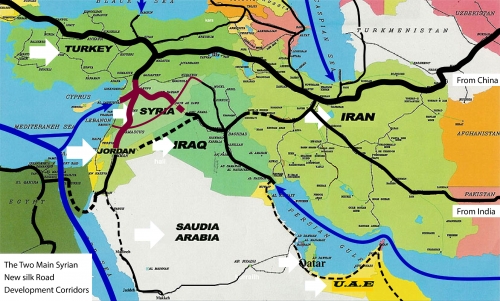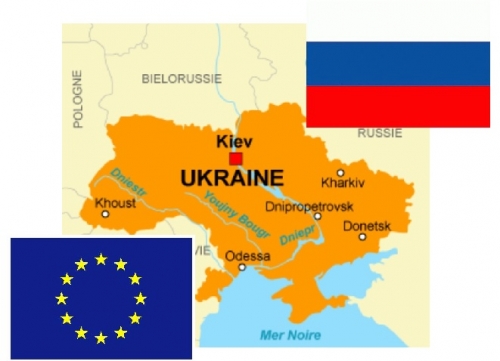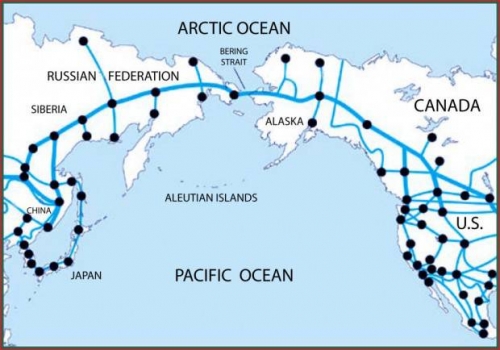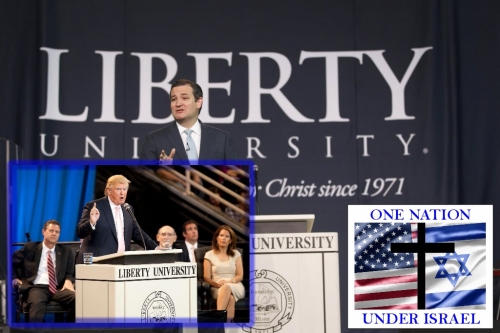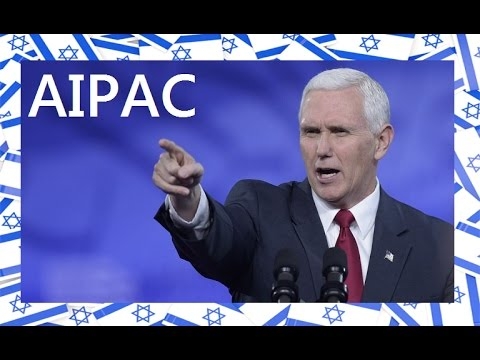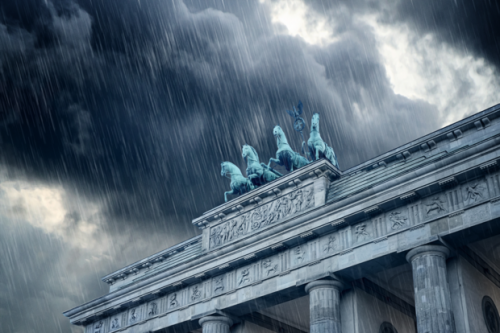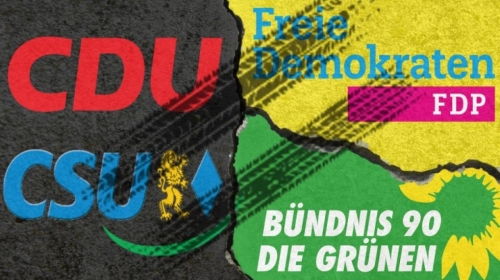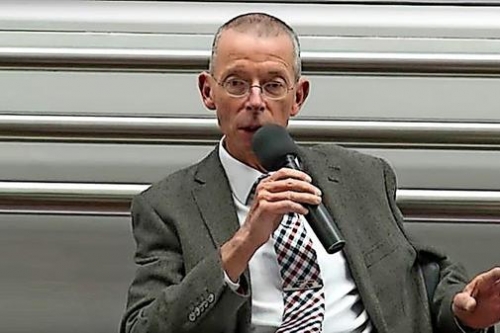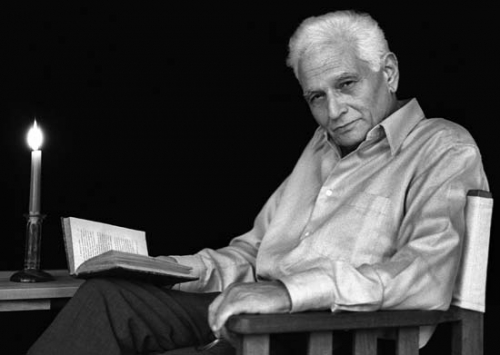
La déconstruction du déconstructeur
Ex: http://www.dedefensa.org
31 décembre 2017 – Nous avons consacré hier 30 décembre 2017 un F&C à partir d’un texte de James Edward Kunstler sur la situation crisique extraordinaire où est emportée l’Amérique. Kunstler parle d’une situation d’“irréalité” (terme qui rencontre certains de nos concepts) et cite deux “opérationnalisation de [cette] irréalité” qui, à notre avis, se complètent pour donner toute sa puissance à l’épisode crisique fondamental et décisif actuel aux USA. Nous nous attachons ici à l'explication de la deuxième “opérationnalisation de l’irréalité”, celle qui a est développée par le progressisme-sociétal. Nous citons le passage décrivant cet évènement
« ... La seconde est ainsi synthétisée par Kunstler, à propos des différentes facettes du progressisme-sociétal tel qu’il s’est développé à une vitesse extraordinaire depuis 2014-2015 et essentiellement à l’occasion de la campagne puis de l’élection de Donald Trump :
» “ L’idée nouvelle et fausse que quelque chose étiqueté ‘discours de hain’ – étiqueté par qui ? –équivaut à la violence qu’il décrit flottait autour des établissements d’enseignement des cycles supérieurs en un nuage toxique d'hystérie intellectuelle concocté dans le laboratoire de la philosophie dite “post-structuraliste”, où gisaient des parties des corps de Michel Foucault, Jacques Derrida, Judith Butler et Gilles Deleuze, qui seraient surmonté d’un cerveau fait d’un tiers de Thomas Hobbes, d'un tiers de Saul Alinsky et d'un tiers de Tupac Shakur, le tout donnant un parfait Frankenstein accouchant d’une monstrueuse pensée... ”
» Ce passage est d’une extrême importance pour nous, dans la mesure essentiellement où Kunstler mentionne quelques noms de “déconstructivistes” dont la pensée pèse sur notre époque, – non pour l’aider à reconstruire quelque chose sur ce qui aurait été détruit mais pour la pousser, pour l’entraîner, pour l’emprisonner dans une irrésistible pulsion de destruction, quel que soit l’objet à détruire. (“Destruction” plutôt que “mort” parce que ces déconstructivistes pensent finalement que la destruction n’est pas la mort, – et c’est en cela que cette pensée est singulièrement diabolique.)... »
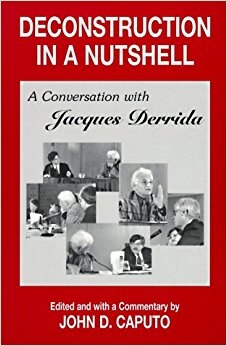 L’on voit l’importance déterminante que Kunstler attribue à un courant philosophique bien connu, celui que l’on connaît sous divers noms dont celui de “déconstruction”. Le nom de Jacques Derrida y figure en bonne place et il nous a semblé ainsi particulièrement opportun de revenir sur un texte F&C (du 27 avril 2015), sur une intervention de Derrida particulièrement révélatrice à notre sens, et en en orientant notre commentaire vers une hypothèse offrant une explication de l’évolution de la politique mondiale avec l’intervention catastrophique de la politiqueSystème conçue d’une façon complètement incontestable comme un phénomène imposé par le Système, lui-même opérationnalisation du “déchaînement de la Matière” ; et, depuis, cet ensemble complété d’une façon encore plus significative par l’accélération extraordinaire du phénomène de dissolution du progressisme-sociétal, avec la grande crise de l’américanisme et du pouvoir de Washington D.C. ouverte à l’été 2015 et qui ne cesse pas de s’aggraver.
L’on voit l’importance déterminante que Kunstler attribue à un courant philosophique bien connu, celui que l’on connaît sous divers noms dont celui de “déconstruction”. Le nom de Jacques Derrida y figure en bonne place et il nous a semblé ainsi particulièrement opportun de revenir sur un texte F&C (du 27 avril 2015), sur une intervention de Derrida particulièrement révélatrice à notre sens, et en en orientant notre commentaire vers une hypothèse offrant une explication de l’évolution de la politique mondiale avec l’intervention catastrophique de la politiqueSystème conçue d’une façon complètement incontestable comme un phénomène imposé par le Système, lui-même opérationnalisation du “déchaînement de la Matière” ; et, depuis, cet ensemble complété d’une façon encore plus significative par l’accélération extraordinaire du phénomène de dissolution du progressisme-sociétal, avec la grande crise de l’américanisme et du pouvoir de Washington D.C. ouverte à l’été 2015 et qui ne cesse pas de s’aggraver.
La “confession” involontaire, ou semi-involontaire du philosophe Derrida, à partir de sa propre expérience d’écrivain et de penseur de la déconstruction, nous suggère une hypothèse opérationnelle et contradictoire implique selon laquelle la déconstruction produite par le déconstructeur alimente la déconstruction de ce même déconstructeur. D’une certaine façon, cette observation n’est nullement contradictoire avec nos conceptions générales car l’on retrouve dans ce cas de “la déconstruction produite par le déconstructeur [alimentant] la déconstruction du déconstructeur” rien de moins qu’une variante de la formule surpuissance-autodestruction. On comprend, au travers des liens de Derrida avec l’évolution de la pensée progressiste-sociétale et de la psychologie de l’américanisme, le lien extrêmement fort et révélateur que nous offre cet incident (la “confession” de Derrida) avec la situation présente.
Le texte du 27 avril 2015 repris ci-dessous a été évidemment relu et modifié en fonction des plus récents événements de ces deux dernières années. Néanmoins, pour l’essentiel, il nous paraît être tout à fait pertinent.

Terreur de Jacques Derrida
27 avril 2015 (relu et actualisé au 31 décembre 2017) – La genèse de ce texte est chronologiquement complexe à établir. Qu’il nous suffise de dire qu’un proche, qui suivait nos travaux concernant notamment le processus-Système de “néantisation” sous la formule dd&e (déstructuration-dissolution-entropisation), nous signala la présence sur YuTube d’une intervention du philosophe “déconstructeur” Jacques Derrida, sous doute datant de 2002, sous le titre (anglais) de Derrida’s Terror. C’est sur ce document que nous appuyons notre texte qui développe une hypothèse ambitieuse.
(Nous sollicitons ici le terme “néantisation” pour désigner en une forme plus définitive le processus dd&e, et bien qu’on puisse arguer que “néantisation” pourrait équivaloir à “entropisation” ; mais le premier néologisme [de Heidegger], d’origine philosophique et métaphysique, semble apte à embrasser la processus général dd&e, plus que le terme “entropisation”, de facture fortement scientifique, et de plus qui fait partie de la formule [dd&e], donc dans une position qu’on pourrait juger inopportunément “juge et partie”. Une hypothèse serait que, dans notre esprit, “entropisation” constituât l’opérationnalisation de la “néantisation” tandis que la “néantisation” engloberait l’ensemble du processus dd&e. C’est à voir et l’on verra. En attendant, on notera ce que Gorge Steiner dit, dans Grammaires de la création [NRF essais/Gallimard, 2001], du terme “néantisation” : « Mais c’est Heidegger qui va le plus loin dans le repliement des contours du langage ordinaire et de la syntaxe rationnelle. Dans le contexte historique qui est déterminant pour cette étude, à l’époque de la longue éclipse des espoirs humains et de la dislocation du temps futur, Heidegger fait du “néant” un verbe : Nichten, “néantir”. Le néologisme va beaucoup plus loin que vernichten, qui signifie “détruire”, “anéantir”. Il laisse pressentir comme à travers un voile, – la notion d’“ombre” est ici cruciale, – l’anéantissement de ce qui existe. »)
Le document Derrida’s Terror, mis sur YuTube le 24 novembre 2008 par un incertain Xenosophia, est manifestement une interview faite par un (des) intervieweur(s) de langue anglaise, ou anglo-américaine sans nul doute (Derrida, décédé en 2004, enseignait régulièrement aux USA, comme on va le voir évidemment). La présentation écrite est en anglais, il y a des sous-titres anglais et, à un moment, Derrida dit une phrase en anglais alors que le reste de son intervention est en français. D’après les indications que nous avons recueillies, il s’agirait d’un document réalisé par deux des anciennes élèves de Derrida, de Kirby Dick & Amy Ziering Kofman (voir ce lien). Le texte de présentation dit ceci (le souligné en caractère gras est de nous : il marque combien l’acte de la déconstruction est irrémédiablement un acte d’une extraordinaire agressivité parce qu’il est une attaque impitoyable contre tout ce qui est, activement ou potentiellement, et même relativement, ordre, harmonie et équilibre) : « Jacques Derrida speaks about the aggressivity that is inevitable in the act of deconstruction, and the fear and anxiety that he experiences as he finds himself “aggressing” other texts, persons, or institutions. » Il y avait 5.591 visions le 25 avril 2015 alors qu’il y en avait eu 1.285 lorsque nous le visionnâmes pour la première fois, le 12 août 2012. Nous l’avons consulté à nouveau, près de deux ans et demi plus tard, et nous enregistrons 6.809 visions. La durée de l’interview est de 3 minutes 48 secondes. Voici sa transcription (Nous avons mis quelques mots en gras, pour souligner ceux qui sont les plus importants pour notre propos ; le mot “i-na-dmi-ssible” “tronçonné” en tirets retranscrit l’intonation de martèlement que Derrida déclame...)
Derrida’s Terror
« …Chaque fois que j’écris quelque chose … Que j’avance dans des espaces où je ne m’étais pas aventuré, ce qui implique des actes qui peuvent sembler agressifs à l’égard de penseurs, ou de collègues… C’est déjà arrivé… Je ne suis pas “polémiqueur” [sic] mais il est vrai que les gestes de type déconstructif ont souvent l’apparence de gestes qui vont déstabiliser, ou angoisser les autres, ou même blesser les autres quelquefois…
» Alors, chaque fois que j’ai fait ce geste là, il y a y eu des moments de peur… Pas au moment où j’écris, parce qu’au moment où j’écris, il y a une espèce de nécessité, une espèce de force, plus forte que moi, qui fait que ce que je dois écrire, je l’écris, quelles que soient les conséquences … Je n’ai jamais renoncé à écrire quoi que ce soit parce que les conséquences me faisaient peur. Rien ne m’intimide quand j’écris. Je dis ce que je pense qui doit être dit. Bon…
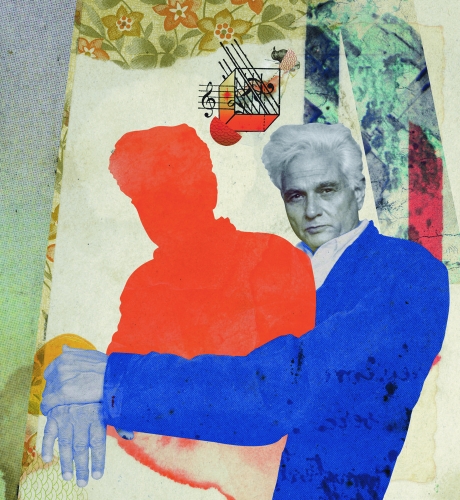
» Cela dit, quand je n’écris pas, quand je ne suis pas en train d’écrire, et à un moment très particulier qui est le moment où je m’endors… When I have a nap and I fall asleep … A ce moment-là, dans un demi-sommeil, je suis effrayé par ce que je suis en train de faire, et je me dis “mais tu es fou, tu es fou d’écrire ça, tu es fou de t’attaquer à ça, tu es fou de critiquer telle ou telle personne, tu es fou de contester telle ou telle autorité, que ce soit une autorité textuelle, une autorité institutionnelle, une autorité personnelle”... Et il y a une sorte de panique, dans un subconscient, comme ça, une sorte de panique, comme si … comme si, à quoi est-ce que je peux comparer ça ? Imaginez un enfant qui fait une chose honteuse, il a fait une chose honteuse, bon… Il y a les rêves d’enfant de Freud, où l’enfant se promène nu, vous savez les rêves où l’on se promène tout nu, et puis l’on est effrayé parce que tout le monde voit que vous êtes nu … Bon… Dans ce demi-sommeil, j’ai l’impression que j’ai fait une chose criminelle, honteuse, inavouable, quelque chose que je n’aurais jamais dû faire… Et quelqu’un est en train de me dire : “Mais tu es fou de faire ça !” … Et c’est l’évidence même, je le crois dans mon demi-sommeil, je le crois… Et donc, l’ordre qui est évident dans cela, c’est “Arrête tout, retire ça, brûle tes papiers… Ce que tu viens de faire est i-na-dmi-ssible !” Mais dès que je me réveille, c’est fini.
» Ca veut dire que… Je l’interprète comme ça, ça veut dire que quand je suis éveillé, conscient, au travail, etc., je suis d’une certaine manière plus inconscient que dans un demi-sommeil… Dans un demi-sommeil, je, je… il y a une certaine vigilance qui me dit la vérité, à savoir que ce que je fais c’est très grave, d’une certaine manière … Mais quand je suis éveillé et au travail, cette vigilance-là est en sommeil. Elle n’est pas la plus forte, et donc je fais ce qui doit être fait… »
Il faut regarder et écouter Derrida, l’esprit dégagé au moins pour cet instant de tout parti pris, voire même de ses propres positions fondamentales, le regarder et l’écouter disons d’humain à humain. Il dit une vérité profonde de son être, de lui-même, qui le tourmente horriblement et dont on sent qu’il ne parviendra jamais à la maîtriser (il mourra deux années après cette intervention), comme s’il en était prisonnier ; et cela, n’est-ce pas, dont on devine qu’il le sait, ou qu’il le devine “comme semi-inconsciemment”, comme lorsqu’il est dans cet état de demi-sommeil qu’il mentionne, où il juge qu’alors une vigilance fondamentale contre des forces extérieures maléfiques reprend sa place et qu’il entend la condamnation de ses écrits comme une vérité qui le remplit de honte.
(En quelque sorte, c’est quand il est conscient, c’est quand il est “libre” qu’il est prisonnier, car alors le venin des idées idéologisées reprend le dessus.)
Il est difficile de ne pas ressentir le sentiment d’une grande compassion, presque un élan de solidarité pour ce qu’il nous dit de la tragédie humaine, et comme nous-mêmes à sa place, nécessairement, nous l’aurions expérimenté dans son intensité quoique chacun à sa manière et selon l’orientation de son esprit. La tragédie intérieure de cet homme se trouve dans cette interrogation : comment surmonter une telle contradiction ? Entre cette “vigilance” qui lui “dit la vérité”, savoir que ce qu’il fait est “i-na-dmi-ssible” et devrait être brûlé, et lui-même, écrivant contre cette vigilance qu’il a écartée, estimant qu’il “fait ce qui doit être fait” ? Entre ceci qui est sa “vigilance” lui disant que ce qu’il fait est “i-na-dmi-ssible” et cela qui lui dit “ce qui doit être fait” qui est ce que sa “vigilance” dénonce ?... Il faut que l’enjeu soit, pour cet esprit, – mais aussi pour la théorie qu’il représente et l’influence qu’eut et qu’a cette théorie, – d’une importance vitale et, surtout, imposé par une force irrésistible et d’une surpuissance exceptionnelle.
(Il faut insister là-dessus, dans ce moment de vérité : Derrida s’explique à lui-même de ses actes comme s’il existait effectivement quelque chose d’extérieur à lui, qui le guide et le force, et la contraint...)
Maintenant, laissons de côté l’aspect humain pour lequel nous disons notre plus grand respect, et venons-en à l’aspect disons plus social et symbolique de définition de la philosophie que représentent Derrida et quelques-uns des philosophes de la même école que lui et qui connurent la même aventure disons pédagogique. Derrida le dit lui-même, – le “geste de type déconstructif” définit le mouvement philosophique qui se développe à partir des références du structuralisme et du poststructuralisme ; on pourrait donc désigner ce mouvement comme celui de “la déconstruction” alors que nous serions conduit, pour notre part, à voir dans ce même mot, en partie l’équivalent de notre “déstructuration-dissolution”. Derrida exprime sa “peur” à propos de l’activation, dont il est lui-même l’ordonnateur, des “gestes de type déconstructif”. Il ne peut prétendre parler, disons comme pourrait le faire un isolé, un non-conformiste, un “poète maudit” ou un philosophe rebelle, un homme dressé contre les conventions et l’ordre établi (effectivement, des positions qui plaisent tant aux “intellectuels” qui se jugent nécessairement “en avance”, là où l’on peut se sentir isolé, angoissé, exposé à la vindicte du conformisme, etc., puisqu’effectivement “en avance” sur tout cela). Bien au contraire. Derrida fut, en son temps, avec ses confrères du post-structuralisme, un véritable maître, et reconnu et encensé comme tel, de la future pensée dominante en train de s’élaborer, – mais nous devrions dire plutôt “psychologie dominante”, car peu nous importe le contenu extraordinairement complexe jusqu’à la micro-conceptualisation, de cette “pensée”. Pour nous, cette “future psychologie dominante” fut absolument la matrice implacable de la “pensée dominante” (pour le coup, le terme “pensée” a sa place), là où cela comptait, comme elle l’est absolument aujourd’hui de la déferlante progressiste-sociétale perçue comme une dynamique de la pensée dont le cours déconstructurationniste est tracé et absolument inarrêtable.
Le livre French Theory, de François Cusset (La Découverte, 2003), nous instruit à propos du formidable succès de ces philosophes français aux USA dans les années 1970. Le “quatrième de couverture” nous suffit à cet égard pour avoir une idée du cheminement de l'influence de cette French Theory, et parce que c’est de psychologie et non de pensée que nous parlons, – et cette psychologie étant parfaitement celle de la “déconstruction”, ou “déstructuration-dissolution”, – ou, si l’on veut employer un néologisme d’une famille de grand style qu’on a déjà suggérée, la “déconstructuration”...
« Sait-on que la science-fiction américaine, du roman “cyberpunk” à la saga “Matrix”, se nourrit largement de Jean Baudrillard ? Que Gilles Deleuze et Félix Guattari inspirent aux États-Unis les pionniers de l’internet et de la musique électronique ? Que Michel Foucault y est une référence majeure des luttes communautaires tandis que Jacques Derrida est une star sans égale dans l’université ? [...] C’est cette histoire, mal connue, de la ‘French Theory’ que François Cusset retrace ici. Il retrace le succès de cette étrange ‘théorie française’, – la déconstruction, le biopouvoir, les micropolitiques ou la simulation [le simulacre], – jusque dans les tréfonds de la sous-culture américaine. Il restitue l’atmosphère particulière des années 1970 et raconte la formidable aventure américaine, et bientôt mondiale, d’intellectuels français marginalisés dans l’Hexagone ...»
Que voilà donc des flons-flons triomphants (où, tout de même, Baudrillard est mis dans le même sac que Foucault, Deleuze, Derrida & Cie, ce qui est pousser le bouchon un peu loin) ... Ils ont l’avantage, ces flons-flons, de nous confirmer contrairement à ce qu'il prétend nous dire, que ces “intellectuels français” ne furent jamais vraiment marginalisés “dans l’Hexagone”... Finalement, c’est cette marginalisation qui a manqué à Derrida et ce manque fait comprendre les arcanes de son drame, parce qu'il s'agit d'une époque où la célébrité fait de vous une victime désignée et vulnérable d’un système maléfique d’une puissance inoiuïe.
 Ainsi revenons-nous au drame de Derrida que restituent les quelques minutes de confidences qu’on a écoutées. Ayant écarté les occurrences sociales et autres qui figurent au début des confidences, nous revenons au plus profond du secret de l’être, pour considérer enfin ce qu’il nous dit en vérité, selon notre interprétation. Dans ces moments de semi-conscience que lui-même (Derrida) qualifie de la plus grande “vigilance”, c’est-à-dire de la lucidité qui dit “la vérité” en écartant l’espèce d’opium de la pure spéculation intellectuelle, l’esprit qui fait “ce qui doit être fait” est confronté à ce jugement terrible : « Ce que tu viens de faire est i-na-dmi-ssible »... Non pas “selon ta fonction, ta position sociale, ton respect de la hiérarchie”, mais parce qu’il s’agit de quelque chose d’“i-na-dmi-ssible” en soi, – et cela ne peut être alors que le fait de céder à la tentation épouvantable, de succomber à l’influence du Mal, d’accepter le simulacre qu’il impose.
Ainsi revenons-nous au drame de Derrida que restituent les quelques minutes de confidences qu’on a écoutées. Ayant écarté les occurrences sociales et autres qui figurent au début des confidences, nous revenons au plus profond du secret de l’être, pour considérer enfin ce qu’il nous dit en vérité, selon notre interprétation. Dans ces moments de semi-conscience que lui-même (Derrida) qualifie de la plus grande “vigilance”, c’est-à-dire de la lucidité qui dit “la vérité” en écartant l’espèce d’opium de la pure spéculation intellectuelle, l’esprit qui fait “ce qui doit être fait” est confronté à ce jugement terrible : « Ce que tu viens de faire est i-na-dmi-ssible »... Non pas “selon ta fonction, ta position sociale, ton respect de la hiérarchie”, mais parce qu’il s’agit de quelque chose d’“i-na-dmi-ssible” en soi, – et cela ne peut être alors que le fait de céder à la tentation épouvantable, de succomber à l’influence du Mal, d’accepter le simulacre qu’il impose.
Si nous disons cela, c’est conduit par la logique autant qu’influencé grandement par l’intuition, laquelle nous a proposé comme évidence que le Mal se manifeste essentiellement par ce processus dd&e, ou pour retrouver notre trouvaille de circonstance, par le processus de “déconstructuration”... Et l’état de semi-conscience où la “vigilance” retrouve sa place naturelle, c’est celui où la psychologie, débarrassée des chaînes des idées auxquelles l’esprit s’est attaché, est capable de percevoir toute la puissance de la vérité et de se faire elle-même messagère de la vérité pour admonester le philosophe. Ainsi Derrida se trouverait-il confronté à la vision affreuse que les idées qu’il développe constitueraient effectivement une transcription socio-intellectuelle de l’influence du Mal (ou du Système pour notre compte, pris dans son sens le plus large d’opérationnalisation du “déchaînement de la Matière”).
Encore une fois, il ne nous viendrait pas à l’esprit de développer cette idée misérable et infondée de faire un procès à Derrida. D’ailleurs, sa “confession” quasi-psychanalytique parle pour lui-même : il représente ce cas qu’on a déjà envisagé d’une intelligence brillante, d’un exceptionnel brio intellectuel, trahis par une psychologie trop faible ou affaiblie (elle n’est capable de transmettre les messages essentiels venus d’un en-dehors ou d’un au-delà que lorsque l’esprit est dans un état de conscience très amoindrie). Il représente cette défaite permanente des psychologies, depuis le XVIIIème siècle (siècle du “persiflage” bien entendu), confrontées aux pressions des salons, de l’université, des milieux intellectuels dominants, bref de tout ce qui fait la modernité dans son activité d’influence par le système de la communication.
(Il ne nous viendrait certes pas à l’esprit, non plus, d’écarter l’idée qu’un intellectuel, un écrivain, un penseur, un essayiste, un philosophe, ne connaît pas de terribles faiblesses dans son travail sans nécessairement avoir sa psychologie affaiblie. S’il fallait identifier la principale, ce serait l’angoisse avec ses différents effets [paralysie de la création, panique, etc.], et l’angoisse à cause du doute, mais non la peur, comme le confie Derrida. [L’angoisse concerne l’inconnu, qui peut être dangereux ou amical, faussaire ou vrai ; la peur, elle, concerne ce qui est connu et dont on sait le danger que cette chose représente, c’est-à-dire la cause de la peur identifiée comme mauvaise ou ennemie ; l’angoisse réclame la vérité de l’énigme qu’on affronte pour pouvoir être surmontée, la peur marque la démarche dont on a identifié le danger.] Outre cette différence entre l’angoisse et la peur, il y a ce fait que l’angoisse ne vient pas dans les états de semi-conscience, sous le coup d’une “vigilance” qui soudain joue son rôle ; elle marque en toute lucidité le travail de la pensée consciente, procédant par à-coups d’incertitudes angoissantes suivies de soudaines certitudes sublimes, suivies à nouveau d’incertitudes angoissantes, etc., –une bataille sans fin pour la vérité, et non pas une avancée sans douter mais transie de peur, pour “faire ce qui doit être fait”, “une espèce de nécessité, une espèce de force, plus forte que moi, qui fait que ce que je dois écrire je l’écris, quelles que soient les conséquences”, – cela dont la “vérité” vous dit par instant que c’est “i-na-dmi-ssible”. Nous n’écartons pas un instant l’idée que l’écrit est l’outil principal de transmission de forces invisibles [voir notamment le 16 avril 2015] et qu’il entraîne l’écrivain considéré alors comme un “messager” bien plus qu’il n’est conduit par lui, mais rien n’assure bien évidemment que dans ces forces ne s’en glissent pas certaines qui représentent une influence maléfique. C'est à la vigilance d'exercer son office.)
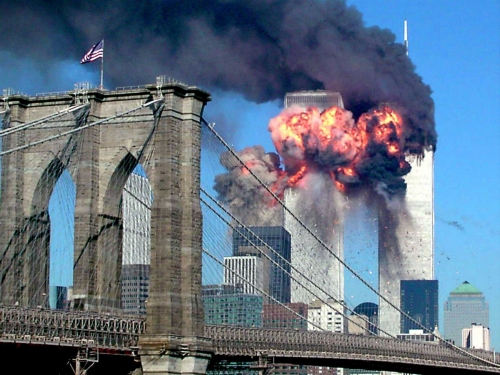
La “déconstructuration“ depuis 9/11
A partir de notre raisonnement intuitif concernant ce cas tel que nous l’identifions, à l’audition de ce remarquable document de la “confession” de Jacques Derrida, et à la lumière de ce qu’on sait de l’extraordinaire succès de la French Theory aux USA, il nous semble qu’une hypothèse opérationnelle historique peut être développée. Il s’agirait de présenter une explication hypothétique pour mieux comprendre notre époque depuis la fin de la Guerre froide et surtout depuis l’attaque du 11 septembre 2001, et essentiellement la politique de l’américanisme qui est apparue finalement comme étant elle-même l’opérationnalisation de la “politiqueSystème” dans spn sens le plus large et dont on sait qu’elle peut, qu’elle doit complètement et parfaitement s’identifier à elle.
(Le concept de “politiqueSystème“ doit être pris ici dans son sens quasiment absolu, c’est-à-dire embrassant politiques extérieures et situations intérieures. Cela va évidemment et nécessairement, ô combien, jusqu’à comprendre l’irruption depuis 1974-1975 de la grande crise intérieure du pouvoir de l’américanisme et du déchaînement du progressisme-sociétal, ou marxisme-culturel comme l’identifient nombre d’intellectuels conservateurs.)
Ce que nous observons, d’abord depuis la fin de la Guerre froide jusqu’à l’attaque 9/11, puis à partir de 9/11, c’est une évolution psychologique US caractérisée par une alternance maniaco-dépressive, d’abord d’un épisode dépressif puis d’un épisode maniaque (à partir de l’été 1996), transcendé ensuite avec 9/11 en une sorte d’épisode hypomaniaque qu’on peut aisément aligner avec un concept tel que l’“idéal de puissance”. Quant à la politique extérieure suivie à partir de 9/11, identifiée comme “politiqueSystème” (dans son épisode “hégémonisme-chaotique”), elle ne présente aucun caractère de cohérence lorsqu’elle est observée sur le terme de la quinzaine d’années nous séparant du 11 septembre 2001. Bien entendu, cette politique a un caractère de surpuissance évident qui est systématiquement interprété comme une politique de conquête hégémonique des USA, — en général d’une façon avantageuse pour les USA, à notre sens en complète contradiction avec la vérité-de-situation à cet égard. Sur ce terme de 2001-2015 on observe que cette conquête hégémonique tourne en rond sur des territoires d’ores et déjà conquis (ou sous l’influence US), si bien qu’on finit par s’interroger sur la cohérence de la chose : combien de fois les USA ne se sont-ils pas lancés à l’assaut de l’Irak depuis 1991 ? Pourquoi les USA n’ont-ils pas aménagé leur écrasante supériorité sur la Russie dans les années 1990, en pratiquant une politique un peu plus habile avec un pays qui leur était quasiment acquis (même Poutine, à ses débuts, ne demandaient qu’à coopérer avec les USA) ? Pourquoi dans ces conditions ouvertes à la coopération, éventuellement à l’intégration-domination de la Russie dans l’OTAN, lancer dès 2002 le programme de missiles antimissiles qui n’a jusqu’ici servi qu’à s’aliéner la Russie et à pousser Poutine vers une réaffirmation de la souveraineté russe, et à un réarmement de son pays ? Etc... Chacune de ses questions sans réponse accentue le jugement d’une politique de complet désordre qui n’est conduite que par l'effet qu'elle produit de la déstructuration et de la dissolution.
Certes, les théories et les complots ne manquent pas, mais eux aussi tournent en rond et ne produisent rien. Il y a les neocons affirmant vouloir refaire les cartes du monde en s’appuyant sur Leo Strauss et proclamant l’ère du “chaos créateur”, il y a l’hypercapitalisme et sa référence à Friedrich von Hayek et la thèse de l’“ordre spontané” aussi vieille que l’Empire du Milieu. Mais rien ne sort de tout ce verbiage de communication dont Strauss et Hayek ne réclameraient certainement pas la paternité. On passe d’une Libye qu’on conquiert pour son pétrole et qui est récupérée par l’anarchie comme l’avaient prévu les adversaires de cette expédition, à une Syrie qu’on ne parvient même pas à attaquer, à une Ukraine qui nous conduit au bord d’un conflit aux proportions inimaginables sans se ménager la moindre issue de secours avant de sombrer dans la paralysie d’un trou noir de gaspillage, de corruption et de désordre, tout cela et dans le même temps en lançant au Moyen-Orient la constitution d’un pseudo-“État Islamique” qu’on finance et qu’on arme tout en le combattant avec fureur, ou en soutenant l’attaque du Yémen par une maison Saoud dont la sénilité a produit soudain un vertige interventionniste, sans très bien savoir contre qui et dans quel but, et qui se trouve soudain à découvert, face aux plus grandes menaces pour sa propre survivance.
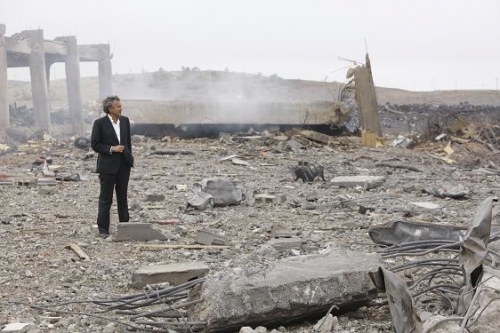
Bien entendu, à partir de 2015 s’est ajouté le volet intérieur, la crise interne du système de l’américanisme sous la poussée du progressisme-sociétal, avatar intérieur et effectivement sociétal de la même politiqueSystme. Là aussu, les psychologies sont touchées en priorité et la pente suivie est, d’une façon aveuglante à force d’être évidente, celle de la “déconstructuration”.
Le résultat est toujours et encore un immense désordre qui ne cesse de grandir et de s’amplifier selon un élan à la fois exponentiel et d’orientation entropique, et se caractérisant par une poussée constante, déstructurante et dissolvante, ou bien “déconstructurante” après tout ... L’impression, souvent émise, est que les intelligences qui mènent cette politique sont, à l’image de la déstructuration-dissolution du pouvoir en divers centres, complètement déstructurées ou déconstruites, donc elles-mêmes transformant la perception du monde qu’elles reçoivent en désordre en restituant évidemment des politiques qui alimentent ce désordre et l’accroissent partout où c’est possible ; il n’y a qu’un pas à faire, et nous le faisons plus souvent qu’à notre tour, pour avancer l’hypothèse que les psychologies qui sont au service de ces intelligences sont elles-mêmes déstructurées et livrent une perception qui l’est nécessairement. C’est bien évidemment à ce point que nous retrouvons Derrida, sa confession extraordinaire et la French Theory.
Notre thèse est que la French Theory, dont on a mesuré le triomphe aux USA par les extraits cités plus haut, et qui toucha tous les domaines, constitua un phénomène psychologique d’une profondeur considérable (il est question des “tréfonds de la sous-culture américaine”). Ce succès concerna certes bien des idées pour ces milieux des élites devenues élites-Système qui entretiennent leur vanité intellectuelle s’il le faut au prix de la destruction du monde, mais il eut surtout un impact fondamental sur les psychologies de ces élites, d’ailleurs à partir de conceptions de déstructuration et de déconstruction correspondant parfaitement à l’esprit de l’américanisme tel qu’on peut le percevoir, notamment dans le flux du “déchaînement de la Matière”.
(On sait combien nous apprécions les États-Unis d’Amérique comme une construction a-historique, “en-dehors de l’Histoire”, donc naturellement productrice d’une politique de déconstruction de l’Histoire allant jusqu’à l’annonce triomphale quoiqu’un peu hasardeuse de la “fin de l’Histoire”, au moment où la French Theory donne tous ses effets sur la psychologie américaniste en accentuant décisivement ses caractères naturels.)
Cette hypothèse donnant un tel effet au constat de l’influence de la French Theory aux USA est largement concevable tant on perçoit avec quelle force l’un des messagers de la “déconstructuration” lui-même, Derrida, est touché au niveau de sa psychologie. La philosophie de la déconstruction et de la déstructuration (“déconstructuration”) touche la psychologie autant que l’esprit, et elle a sur la psychologie un effet déconstructeur et déstructurant qui agit de toutes les façons sur l’esprit, sans même qu’il soit nécessaire d’assimiler les idées portées par la philosophie elle-même.
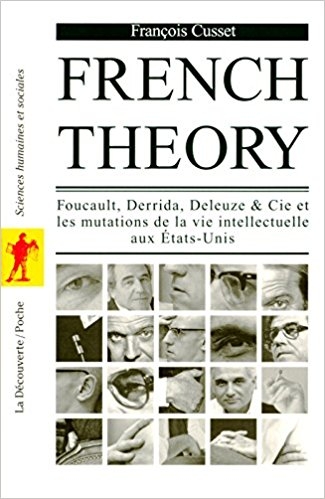 Les philosophes de la French Theory eurent un peu le même effet que celui qu’amena Sigmund Freud en le pressentant largement, lors de son premier voyage aux USA en 1909, lorsqu’il s’exclama que ce pays-continent était la terre rêvée pour la psychanalyse tant il était producteur fondamental de la névrose caractéristique de la modernité, désignée en 1879 par le Dr. Beard comme “le mal américain”. Simplement, à un peu moins d’un siècle de distance, ils ont décisivement prolongé Freud pour porter la psychologie de l’américanisme à son point de fusion, lorsqu’elle devint le parfait serviteur du Système en se déstructurant. La French Theory servait sur un plateau de fer et de tonnerre le destin des USA d’après la Guerre froide : une psychologie à la fois absolument déstructurée et absolument déstructurante, ou absolument “déconstructurante” si l’on veut, avec des idées plus ou moins précisées à mesure, qu’on peut de temps en temps saupoudrer de neocon ou de von Hayek, sans oublier la “démocratie” dont l’idée portée vers des lieux impréparés pour cela enfante elle aussi le désordre par “déconstructuration”.
Les philosophes de la French Theory eurent un peu le même effet que celui qu’amena Sigmund Freud en le pressentant largement, lors de son premier voyage aux USA en 1909, lorsqu’il s’exclama que ce pays-continent était la terre rêvée pour la psychanalyse tant il était producteur fondamental de la névrose caractéristique de la modernité, désignée en 1879 par le Dr. Beard comme “le mal américain”. Simplement, à un peu moins d’un siècle de distance, ils ont décisivement prolongé Freud pour porter la psychologie de l’américanisme à son point de fusion, lorsqu’elle devint le parfait serviteur du Système en se déstructurant. La French Theory servait sur un plateau de fer et de tonnerre le destin des USA d’après la Guerre froide : une psychologie à la fois absolument déstructurée et absolument déstructurante, ou absolument “déconstructurante” si l’on veut, avec des idées plus ou moins précisées à mesure, qu’on peut de temps en temps saupoudrer de neocon ou de von Hayek, sans oublier la “démocratie” dont l’idée portée vers des lieux impréparés pour cela enfante elle aussi le désordre par “déconstructuration”.
Drôle d’hypothèse ou drôle de théorie finalement, que de proposer un tel rôle à la French Theory, matrice de la postmodernité et dont la position épouse parfaitement l’invasion universelle du “marché” et de l’effet de déconstruction et de déstructuration qu’il exige pour être quitte de toutes les règles et de tous les principes. On retrouve le même mouvement dans le monde de l’art, avec la déconstruction complète de la notion d’“art” qu’implique l’“Art Contemporain” (l’AC), lui aussi entièrement créature créée par le “marché”, le Corporate Power et l’hypercapitalisme, – et tous ces bouleversements pesant affreusement sur les psychologies de leurs principaux acteurs, toujours dans le même sens “déconstructurant”...
On observerait alors plusieurs enchaînement à la fois contradictoires et logiques ... Les USA qui purent se constituer grâce à la France et son intervention lors de leur guerre de l’indépendance, lancés à la conquête du monde par l’américanisation (vieux projet évident dès la fin du XIXème siècle) dans un sens qui trahissait évidemment les conceptions françaises engagées lors de l’aide aux insurgents de 1776 (voir la Deuxième Partie du Tome-I de La Grâce de l’Histoire) ; recevant en retour, deux siècles plus tard, de la France, productrice tout au long de son histoire du pire et du meilleur de l’esprit dans un affrontement métahistorique colossal, la French Theory qui pourrait bien être la recette pour accomplir le destin annoncé par Lincoln-1838 (« En tant que nation d’hommes libres, nous devons éternellement survivre, ou mourir en nous suicidant ») ... Le problème, sans nul doute, est que nous sommes du voyage, et il faut espérer qu’il y a plus d’embarcations de sauvetage qu’il n’y en avait sur le Titanic.
Au reste, on conviendra que ce rangement ne contredit en rien celui, plus général, que nous proposons avec la thèse du “déchaînement de la Matière”. Il s’y insère parfaitement, avec cette proximité jusqu’à l’intimité de la volonté de déstructuration (et la dissolution des esprits et des formes), de déstructuration-dissolution, de “déconstructuration”, qui s’ensuit, qui est le caractère même de la modernité, aussi bien que des phénomènes que nous observons, en constante progression depuis plus de deux siècles et entrés dans une phase d’accélération foudroyante depuis un quart de siècle et particulièrement depuis 2001. Il faut dire que les trois minutes 48 secondes de la “confession” de Derrida, celle-ci avec son caractère tragique et sa résonnance pathétique, nous suggèrent effectivement que l’on se trouve là devant un phénomène dont la description et la signification touchent aux choses les plus hautes et à l’inversion la plus basses de ces choses les plus hautes. Comme si s’ouvrait soudain, devant nous, une porte d’un pan essentiel pour notre contre-civilisation du Grand Mystère...

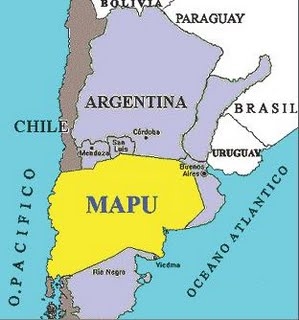 Les ennemis des Mapuches sont les politiques qui gèrent ces territoires et les congrégations multinationales qui exploitent pétrole, électricité, mines, tourisme. On citera Benetton, propriétaire de 900.000 ha dans les provinces de Rio Negro, Chubut et Santa Cruz ; Joe Lewis, ex-propriétaire de la chaîne Hard Rock ; Ted Turner, Georges Soros, Perez Companc, Amalita Lacroze de Fortabat, etc.
Les ennemis des Mapuches sont les politiques qui gèrent ces territoires et les congrégations multinationales qui exploitent pétrole, électricité, mines, tourisme. On citera Benetton, propriétaire de 900.000 ha dans les provinces de Rio Negro, Chubut et Santa Cruz ; Joe Lewis, ex-propriétaire de la chaîne Hard Rock ; Ted Turner, Georges Soros, Perez Companc, Amalita Lacroze de Fortabat, etc.




 del.icio.us
del.icio.us
 Digg
Digg

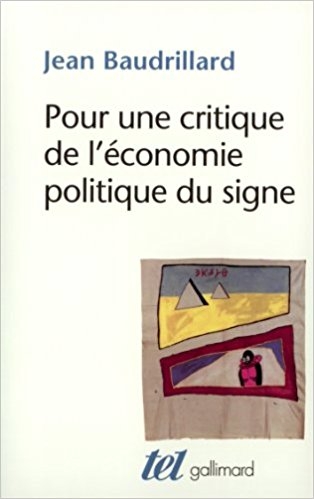 De l’économie politique des signes, critiquée par Baudrillard, nous sommes passés au nouvel horizon du capitalisme fondé sur l’économie de l’attention. Dans cette économie, l’homme n’est plus seulement pensé en termes de valeur d’échange mais aussi en termes de valeur d’attention. Simultanément, l’individu, dégagé de toute obligation collective d’ordre politique ou transcendental-religieux, « libéré » de ses liens symboliques ou personnels, enfin « privé » et autonome, se définit par une activité d’allocataire d’attentions disparates, furtives et fluides. L’attention, étant le plus souvent spoliée, détournée vers des offres et des besoins artificiels et préconçus dans cet univers le plus souvent virtuel, s’intègre dans un système de codification (les likes chez Facebook, on like pour être like-é) non dénué de toute forme ostensible evoquée par Thorstein Veblen à propos de la consommation ostentatoire.
De l’économie politique des signes, critiquée par Baudrillard, nous sommes passés au nouvel horizon du capitalisme fondé sur l’économie de l’attention. Dans cette économie, l’homme n’est plus seulement pensé en termes de valeur d’échange mais aussi en termes de valeur d’attention. Simultanément, l’individu, dégagé de toute obligation collective d’ordre politique ou transcendental-religieux, « libéré » de ses liens symboliques ou personnels, enfin « privé » et autonome, se définit par une activité d’allocataire d’attentions disparates, furtives et fluides. L’attention, étant le plus souvent spoliée, détournée vers des offres et des besoins artificiels et préconçus dans cet univers le plus souvent virtuel, s’intègre dans un système de codification (les likes chez Facebook, on like pour être like-é) non dénué de toute forme ostensible evoquée par Thorstein Veblen à propos de la consommation ostentatoire.


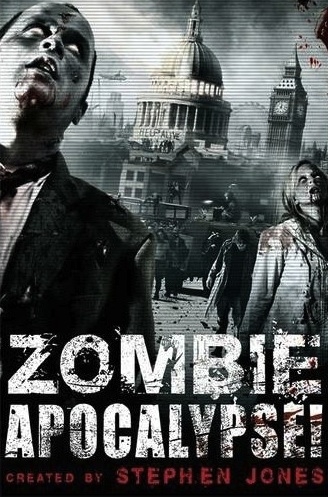


 L’on voit l’importance déterminante que Kunstler attribue à un courant philosophique bien connu, celui que l’on connaît sous divers noms dont celui de “déconstruction”. Le nom de Jacques Derrida y figure en bonne place et il nous a semblé ainsi particulièrement opportun de revenir sur un texte F&C (
L’on voit l’importance déterminante que Kunstler attribue à un courant philosophique bien connu, celui que l’on connaît sous divers noms dont celui de “déconstruction”. Le nom de Jacques Derrida y figure en bonne place et il nous a semblé ainsi particulièrement opportun de revenir sur un texte F&C (

 Ainsi revenons-nous au drame de Derrida que restituent les quelques minutes de confidences qu’on a écoutées. Ayant écarté les occurrences sociales et autres qui figurent au début des confidences, nous revenons au plus profond du secret de l’être, pour considérer enfin ce qu’il nous dit en vérité, selon notre interprétation. Dans ces moments de semi-conscience que lui-même (Derrida) qualifie de la plus grande “vigilance”, c’est-à-dire de la lucidité qui dit “la vérité” en écartant l’espèce d’opium de la pure spéculation intellectuelle, l’esprit qui fait “ce qui doit être fait” est confronté à ce jugement terrible : « Ce que tu viens de faire est i-na-dmi-ssible »... Non pas “selon ta fonction, ta position sociale, ton respect de la hiérarchie”, mais parce qu’il s’agit de quelque chose d’“i-na-dmi-ssible” en soi, – et cela ne peut être alors que le fait de céder à la tentation épouvantable, de succomber à l’influence du Mal, d’accepter le simulacre qu’il impose.
Ainsi revenons-nous au drame de Derrida que restituent les quelques minutes de confidences qu’on a écoutées. Ayant écarté les occurrences sociales et autres qui figurent au début des confidences, nous revenons au plus profond du secret de l’être, pour considérer enfin ce qu’il nous dit en vérité, selon notre interprétation. Dans ces moments de semi-conscience que lui-même (Derrida) qualifie de la plus grande “vigilance”, c’est-à-dire de la lucidité qui dit “la vérité” en écartant l’espèce d’opium de la pure spéculation intellectuelle, l’esprit qui fait “ce qui doit être fait” est confronté à ce jugement terrible : « Ce que tu viens de faire est i-na-dmi-ssible »... Non pas “selon ta fonction, ta position sociale, ton respect de la hiérarchie”, mais parce qu’il s’agit de quelque chose d’“i-na-dmi-ssible” en soi, – et cela ne peut être alors que le fait de céder à la tentation épouvantable, de succomber à l’influence du Mal, d’accepter le simulacre qu’il impose.

 Les philosophes de la French Theory eurent un peu le même effet que celui qu’amena Sigmund Freud en le pressentant largement, lors de son premier voyage aux USA en 1909, lorsqu’il s’exclama que ce pays-continent était la terre rêvée pour la psychanalyse tant il était producteur fondamental de la névrose caractéristique de la modernité, désignée en 1879 par le Dr. Beard comme “
Les philosophes de la French Theory eurent un peu le même effet que celui qu’amena Sigmund Freud en le pressentant largement, lors de son premier voyage aux USA en 1909, lorsqu’il s’exclama que ce pays-continent était la terre rêvée pour la psychanalyse tant il était producteur fondamental de la névrose caractéristique de la modernité, désignée en 1879 par le Dr. Beard comme “
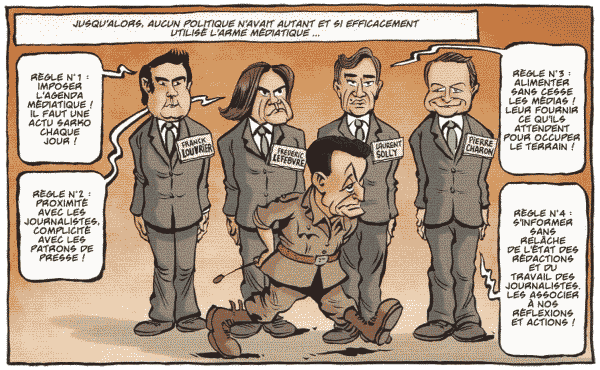

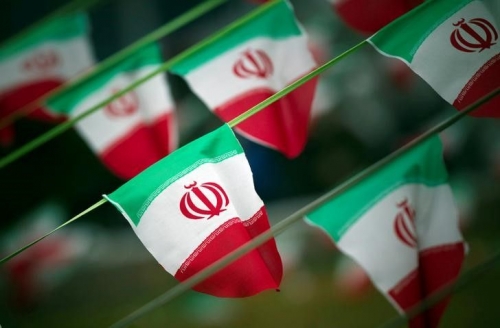

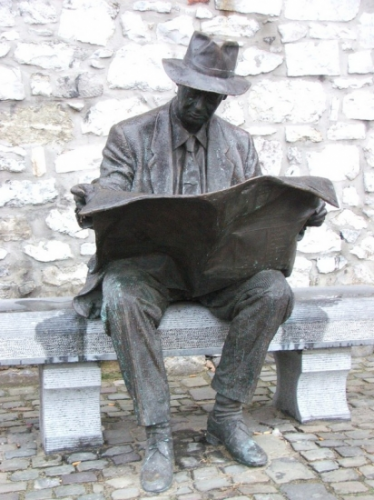
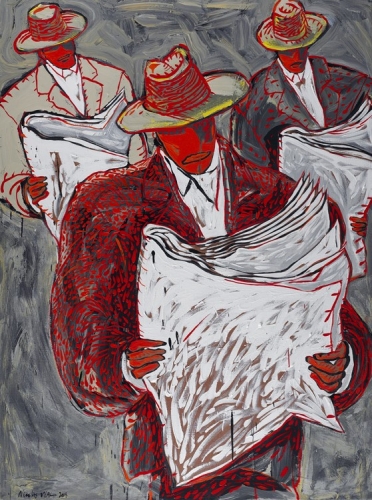



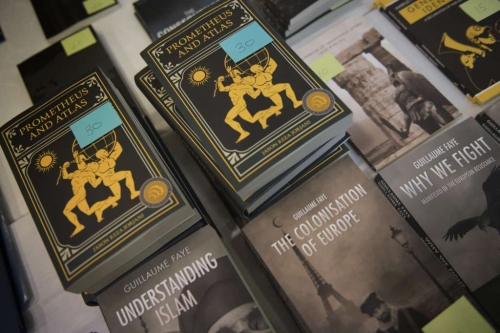


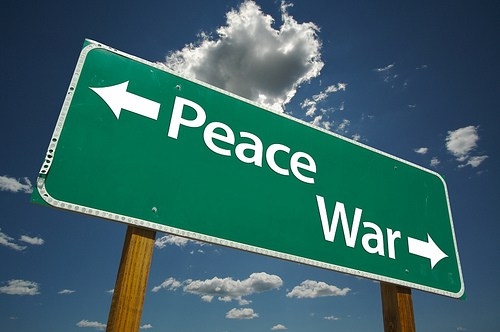

 The Alt-Right broadly defined would be anything on the Right that is in opposition to the neocon-led Republican alliance. This could include everything from many Donald Trump voters in the mainstream, to various tendencies that have been given such labels as the “alt-lite,” the new right, the radical right, the populist right, the dark enlightenment, the identitarians, the neo-reactionaries, the manosphere (or “men’s right advocates”), civic nationalists, economic nationalists, Southern nationalists, white nationalists, paleoconservatives, right-wing anarchists, right-leaning libertarians (or “paleolibertarians”), right-wing socialists, neo-monarchists, tendencies among Catholic or Eastern Orthodox traditionalists, neo-pagans, Satanists, adherents of the European New Right, Duginists, Eurasianists, National-Bolsheviks, conspiracy theorists, and, of course, actually self-identified Fascists and National Socialists. I have encountered all of these perspectives and others in Alt-Right circles.
The Alt-Right broadly defined would be anything on the Right that is in opposition to the neocon-led Republican alliance. This could include everything from many Donald Trump voters in the mainstream, to various tendencies that have been given such labels as the “alt-lite,” the new right, the radical right, the populist right, the dark enlightenment, the identitarians, the neo-reactionaries, the manosphere (or “men’s right advocates”), civic nationalists, economic nationalists, Southern nationalists, white nationalists, paleoconservatives, right-wing anarchists, right-leaning libertarians (or “paleolibertarians”), right-wing socialists, neo-monarchists, tendencies among Catholic or Eastern Orthodox traditionalists, neo-pagans, Satanists, adherents of the European New Right, Duginists, Eurasianists, National-Bolsheviks, conspiracy theorists, and, of course, actually self-identified Fascists and National Socialists. I have encountered all of these perspectives and others in Alt-Right circles.

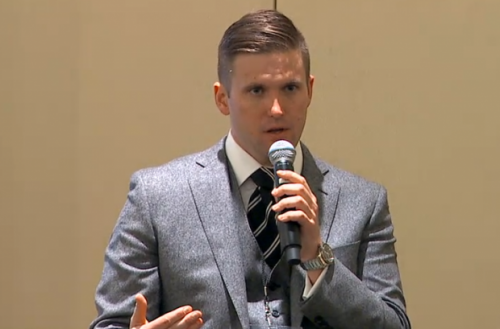
 These comments are fairly representative of the rhetoric used by mainstream conservatives who attempt to either portray the Alt-Right as leftists, or label the Alt-Right as fascists and then claim fascism is really on the Left. The general argument that is made by mainstream conservatives in response to the Alt-Right is that “true” conservatism or the “true” Right is actually veneration for the Enlightenment-influenced ideas found in the Declaration of Independence, veneration of the Founding Fathers, and reverence for the Constitution as a kind of secular Bible. Parallel to these claims is the idea of America as a “propositional nation” that has no roots in any kind of history, culture, or tradition other than just a very vaguely defined “Judeo-Christianity.” This idea of what “conservatism” supposedly is basically amounts to being for so-called “limited government,” so-called “free enterprise,” “individualism,” and various other vaguely defined abstractions, plus policy preferences like a so-called “strong national defense” (which is often just a euphemism for the neoconservatives’ foreign policy agenda), and various center-right policy prescriptions like tax cuts, opposing Obamacare, opposing affirmative action, opposing gun control, opposing abortion, opposing gay marriage, supporting school vouchers, and other ideas we are all familiar with.
These comments are fairly representative of the rhetoric used by mainstream conservatives who attempt to either portray the Alt-Right as leftists, or label the Alt-Right as fascists and then claim fascism is really on the Left. The general argument that is made by mainstream conservatives in response to the Alt-Right is that “true” conservatism or the “true” Right is actually veneration for the Enlightenment-influenced ideas found in the Declaration of Independence, veneration of the Founding Fathers, and reverence for the Constitution as a kind of secular Bible. Parallel to these claims is the idea of America as a “propositional nation” that has no roots in any kind of history, culture, or tradition other than just a very vaguely defined “Judeo-Christianity.” This idea of what “conservatism” supposedly is basically amounts to being for so-called “limited government,” so-called “free enterprise,” “individualism,” and various other vaguely defined abstractions, plus policy preferences like a so-called “strong national defense” (which is often just a euphemism for the neoconservatives’ foreign policy agenda), and various center-right policy prescriptions like tax cuts, opposing Obamacare, opposing affirmative action, opposing gun control, opposing abortion, opposing gay marriage, supporting school vouchers, and other ideas we are all familiar with.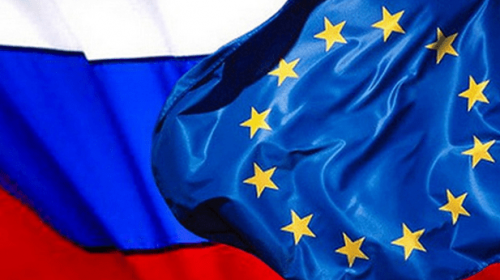
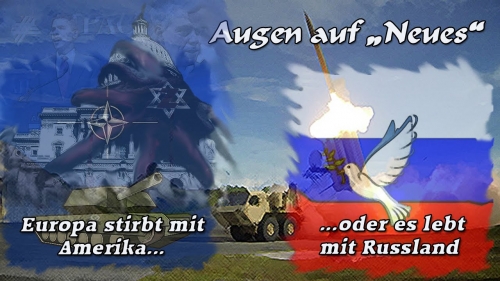
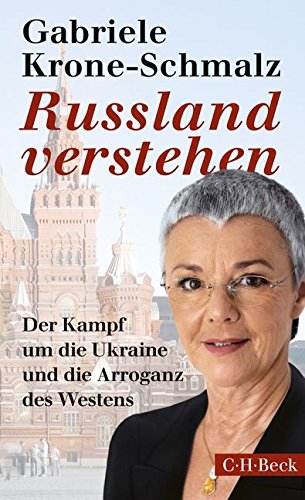
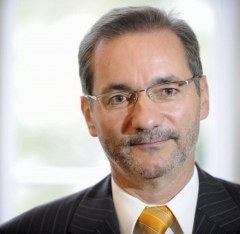 En 1994, il fut de nouveau nommé ministre, et en 1995 Matthias Platzeck a rejoint le SPD. En 1997, Matthias Platzeck fut félicité pour sa gestion des opérations lors des inondations catastrophiques de l’Oder en juillet et août. Depuis juin 1998, il appartient au Comité national du SPD au Brandebourg. En 2005, il a été nommé président du SPD. De 1998 à 2002, il a été maire de Potsdam. En 2002, il a été élu Ministre-président du Land de Brandebourg par le Parlement. En 2004 puis en 2009, il a chaque fois été réélu Ministre-président de Brandebourg. En 2013, il s’est retiré de son poste pour raisons de santé. Matthias Platzeck a reçu de nombreuses distinctions, entre autres la Croix fédérale du mérite de première classe de la République fédérale d’Allemagne (1998), l’Ordre «Pierre le Grand» de l’Académie russe pour les questions de sécurité, de défense et du système juridique (2005), la Grande Croix fédérale du mérite avec étoile et bandoulière de la République fédérale d’Allemagne (2011).
En 1994, il fut de nouveau nommé ministre, et en 1995 Matthias Platzeck a rejoint le SPD. En 1997, Matthias Platzeck fut félicité pour sa gestion des opérations lors des inondations catastrophiques de l’Oder en juillet et août. Depuis juin 1998, il appartient au Comité national du SPD au Brandebourg. En 2005, il a été nommé président du SPD. De 1998 à 2002, il a été maire de Potsdam. En 2002, il a été élu Ministre-président du Land de Brandebourg par le Parlement. En 2004 puis en 2009, il a chaque fois été réélu Ministre-président de Brandebourg. En 2013, il s’est retiré de son poste pour raisons de santé. Matthias Platzeck a reçu de nombreuses distinctions, entre autres la Croix fédérale du mérite de première classe de la République fédérale d’Allemagne (1998), l’Ordre «Pierre le Grand» de l’Académie russe pour les questions de sécurité, de défense et du système juridique (2005), la Grande Croix fédérale du mérite avec étoile et bandoulière de la République fédérale d’Allemagne (2011).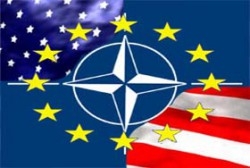
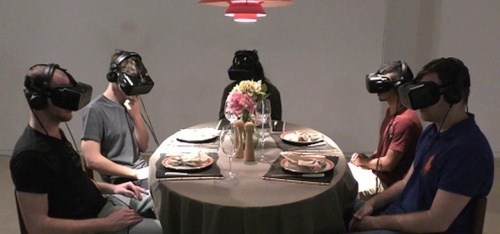



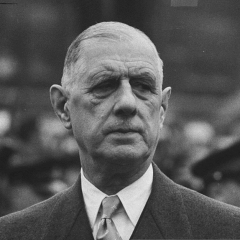 La France fut partiellement épargnée par ce mouvement en raison du caudillisme introduit par De Gaulle en 1958 après la déroute de la Quatrième République, qui était justement intrinsèquement libérale. La personnalité du Général-Président put contenir les Libéraux et la majeure partie d’entre eux se replièrent dans l’ombre non sans phagocyter les partis politiques de sorte que ce ne fut qu’un court répit comme nous le verrons.
La France fut partiellement épargnée par ce mouvement en raison du caudillisme introduit par De Gaulle en 1958 après la déroute de la Quatrième République, qui était justement intrinsèquement libérale. La personnalité du Général-Président put contenir les Libéraux et la majeure partie d’entre eux se replièrent dans l’ombre non sans phagocyter les partis politiques de sorte que ce ne fut qu’un court répit comme nous le verrons. Une seconde vague libérale devait alors être déclenchée pour asséner aux sociétés occidentales agonisantes et à leur corps politique malade le dernier souffle. Après l’idéologie de Mai 68, plus ou moins dérivée de l’École de Francfort, une nouvelle arme sera forgée pour détruire l’Europe (et en partie, le reste du monde), une arme encore plus efficace. Cette arme sera l’infâme thatchérisme néolibéral. A la fin des années soixante-dix, le néo-libéralisme (qu’il soit thatchérien ou reaganien) était donc célébré partout comme la nouvelle libération idéologique qui permettait de nous débarrasser enfin de l’État. Ni les démocrates-chrétiens ni les sociaux-démocrates ne purent loyalement résister à la tentation même s’ils rappelaient parfois à leurs partisans que la Doctrine de l’Eglise (basée sur Thomas d’Aquin et Aristote) ou l’interventionnisme socialiste traditionnel était totalement hostile à un libéralisme débridé. Les économistes devinrent alors plus importants que les politiciens. Nous entrons dans ce qu’on appela alors la « fin de l’Histoire », le règne absolu du marché. Pire, le système des partis où les démocrates-chrétiens et les sociaux-démocrates s’étaient péniblement hissés, empêcha toute critique rationnelle ou la possibilité d’un quelconque changement, en bloquant le processus démocratique que les réformistes chrétiens ou socialistes prétendaient orgueilleusement incarner à eux tous seuls. L’Europe est effectivement maintenant dans une sombre impasse et paraît incapable d’échapper au libéralisme de Mai 68 aussi bien qu’au néo-libéralisme.Ces forces de transformation semblent incapables de rassembler suffisamment de votes pour pouvoir obtenir un changement de pouvoir effectif. Nous devons prendre aussi en compte le fait que les forces du système ont été au pouvoir depuis maintenant plus de soixante-dix ans et que par conséquent, elles occupent littéralement les institutions à tous les niveaux par la nomination de fonctionnaires officiels qui ne pourront pas être remplacés instantanément en cas d’irruption soudaine d’une nouvelle légitimité populaire. Les défis risquent en tout cas de lancer les nouveaux parvenus dans des domaines qu’ils seront bien incapables de maîtriser.
Une seconde vague libérale devait alors être déclenchée pour asséner aux sociétés occidentales agonisantes et à leur corps politique malade le dernier souffle. Après l’idéologie de Mai 68, plus ou moins dérivée de l’École de Francfort, une nouvelle arme sera forgée pour détruire l’Europe (et en partie, le reste du monde), une arme encore plus efficace. Cette arme sera l’infâme thatchérisme néolibéral. A la fin des années soixante-dix, le néo-libéralisme (qu’il soit thatchérien ou reaganien) était donc célébré partout comme la nouvelle libération idéologique qui permettait de nous débarrasser enfin de l’État. Ni les démocrates-chrétiens ni les sociaux-démocrates ne purent loyalement résister à la tentation même s’ils rappelaient parfois à leurs partisans que la Doctrine de l’Eglise (basée sur Thomas d’Aquin et Aristote) ou l’interventionnisme socialiste traditionnel était totalement hostile à un libéralisme débridé. Les économistes devinrent alors plus importants que les politiciens. Nous entrons dans ce qu’on appela alors la « fin de l’Histoire », le règne absolu du marché. Pire, le système des partis où les démocrates-chrétiens et les sociaux-démocrates s’étaient péniblement hissés, empêcha toute critique rationnelle ou la possibilité d’un quelconque changement, en bloquant le processus démocratique que les réformistes chrétiens ou socialistes prétendaient orgueilleusement incarner à eux tous seuls. L’Europe est effectivement maintenant dans une sombre impasse et paraît incapable d’échapper au libéralisme de Mai 68 aussi bien qu’au néo-libéralisme.Ces forces de transformation semblent incapables de rassembler suffisamment de votes pour pouvoir obtenir un changement de pouvoir effectif. Nous devons prendre aussi en compte le fait que les forces du système ont été au pouvoir depuis maintenant plus de soixante-dix ans et que par conséquent, elles occupent littéralement les institutions à tous les niveaux par la nomination de fonctionnaires officiels qui ne pourront pas être remplacés instantanément en cas d’irruption soudaine d’une nouvelle légitimité populaire. Les défis risquent en tout cas de lancer les nouveaux parvenus dans des domaines qu’ils seront bien incapables de maîtriser.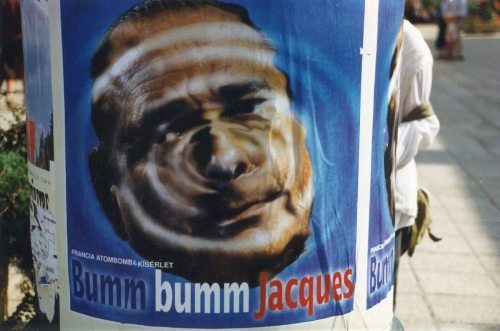
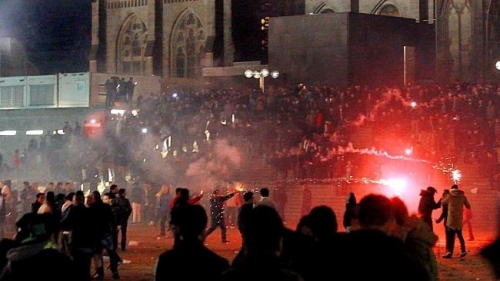
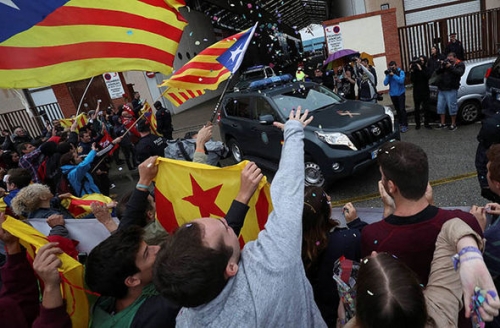
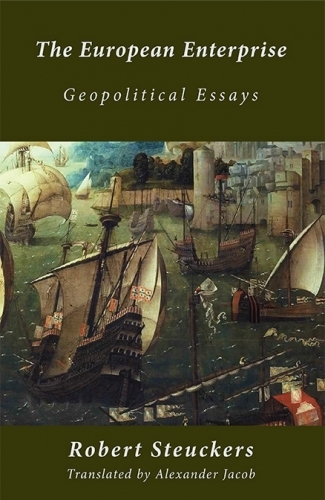 En 2016, vous publiez en anglais votre livre The European Enterprise: Geopolitical Essays. Vous y explorez brillamment les fondements historiques, culturels et spirituels des grands empires européens,à savoir le début du Reich, qui n’est pas du tout l’équivalent pour vous du mot français « nation » et vous estimez que le développement naturel de l’Europe a été entravé ou détourné par la « civilisation occidentale ». Vous accordez aussi une attention toute particulière dans ce livre au « thème russe », à l’espace russe et au concept d’Eurasie. Pourquoi cet espace est-il nécessaire à l’ère de la mondialisation et alors que les États-Unis tentent d’imposer leur hégémonie mondiale ou de « globaliser » leur propre modèle politique et économique ?
En 2016, vous publiez en anglais votre livre The European Enterprise: Geopolitical Essays. Vous y explorez brillamment les fondements historiques, culturels et spirituels des grands empires européens,à savoir le début du Reich, qui n’est pas du tout l’équivalent pour vous du mot français « nation » et vous estimez que le développement naturel de l’Europe a été entravé ou détourné par la « civilisation occidentale ». Vous accordez aussi une attention toute particulière dans ce livre au « thème russe », à l’espace russe et au concept d’Eurasie. Pourquoi cet espace est-il nécessaire à l’ère de la mondialisation et alors que les États-Unis tentent d’imposer leur hégémonie mondiale ou de « globaliser » leur propre modèle politique et économique ?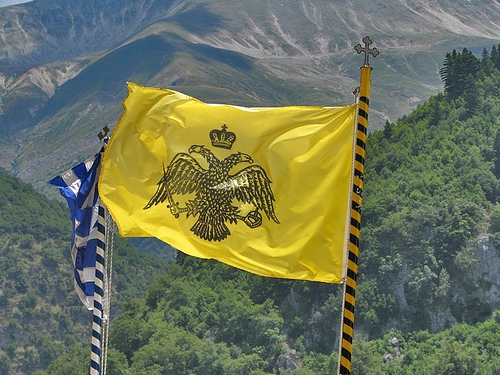 L’axe du Danube a été coupé au niveau des « Portes de Fer », par delà lesquelles la zone byzantine s’étendait vers l’Est. L’Empire byzantin était l’héritier direct de l’Empire romain: là, la légitimité n’y fut jamais contestée. La communauté du mont Athos est un centre spirituel qui a pleinement été reconnu tout récemment par le président russe Vladimir Poutine.L’Empire romain-germanique (plus tard austro-hongrois),l’Empire russe comme héritier de Byzance et la communauté religieuse du Mont Athos partagent les mêmes symboles, celui du drapeau d’or avec un aigle bicéphale noir, vestige d’un vieux culte traditionnel perse où les oiseaux assuraient le lien entre la Terre et le Ciel, entre les hommes et les Dieux. L’aigle est l’oiseau le plus majestueux qui vole dans les hauteurs les plus élevées du ciel, et il est devenu évidemment le symbole de la dimension sacrée de l’Empire. Ainsi vivre dans les cadres territoriaux d’un Empire signifie d’abord accomplir une tâche spirituelle: établir sur la Terre une harmonie semblable à celle qui gouverne l’ordre céleste. La colombe qui symbolise l’Esprit Saint dans la tradition chrétienne avait en fait la même tâche symbolique que l’aigle dans la tradition impériale: sécuriser le lien entre le royaume ouranien (l’Uranus grec et la Varuna védique) et la Terre (Gaïa).
L’axe du Danube a été coupé au niveau des « Portes de Fer », par delà lesquelles la zone byzantine s’étendait vers l’Est. L’Empire byzantin était l’héritier direct de l’Empire romain: là, la légitimité n’y fut jamais contestée. La communauté du mont Athos est un centre spirituel qui a pleinement été reconnu tout récemment par le président russe Vladimir Poutine.L’Empire romain-germanique (plus tard austro-hongrois),l’Empire russe comme héritier de Byzance et la communauté religieuse du Mont Athos partagent les mêmes symboles, celui du drapeau d’or avec un aigle bicéphale noir, vestige d’un vieux culte traditionnel perse où les oiseaux assuraient le lien entre la Terre et le Ciel, entre les hommes et les Dieux. L’aigle est l’oiseau le plus majestueux qui vole dans les hauteurs les plus élevées du ciel, et il est devenu évidemment le symbole de la dimension sacrée de l’Empire. Ainsi vivre dans les cadres territoriaux d’un Empire signifie d’abord accomplir une tâche spirituelle: établir sur la Terre une harmonie semblable à celle qui gouverne l’ordre céleste. La colombe qui symbolise l’Esprit Saint dans la tradition chrétienne avait en fait la même tâche symbolique que l’aigle dans la tradition impériale: sécuriser le lien entre le royaume ouranien (l’Uranus grec et la Varuna védique) et la Terre (Gaïa).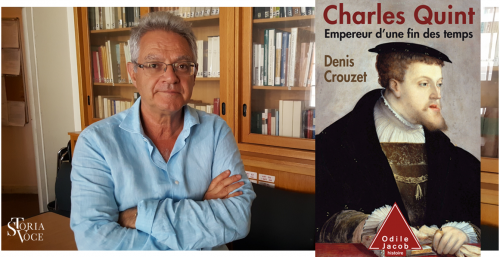
 Après Luther, les éléments puritains extrémistes de la Réforme du nord de la France, des Pays-Bas, de Münster et de Grande-Bretagne feront en sorte que cette « théologie de la précipitation » soit encore plus virulente, dans l’Angleterre anglicane mais aussi dans le « royaume protestant » des Treize Colonies d’Amérique du Nord, comme en témoignent les événements tragiques de l’époque: la décapitation du roi Charles Ier due à la révolution puritaine de Cromwell. Cette façon de voir l’histoire comme une malédiction profonde a été transmise aux Pères fondateurs des futurs États-Unis. Avec la tradition déiste en Angleterre et la tradition politique Whig en Grande-Bretagne et en Amérique du Nord, cette « théologie de la précipitation » se rationalisera perfidement en se donnant un vernis progressiste, celui des Lumières qui culminera dans le plan du président Wilson visant à purger le monde du mal. La « philosophie de la précipitation » (et non la « théologie ») des philosophes français conduira à une eschatologie politique laïque sous l’ombre tutélaire de la guillotine, sous laquelle tous ceux qui soi-disant freinaient le processus devaient périr préventivement et avoir la tête coupée. Après Wilson, plusieurs diplomates américains vont forger des principes qui empêchent que la souveraineté en propre des États puisses’exprimer par le biais de projets programmatiques avec ou sans guerres.
Après Luther, les éléments puritains extrémistes de la Réforme du nord de la France, des Pays-Bas, de Münster et de Grande-Bretagne feront en sorte que cette « théologie de la précipitation » soit encore plus virulente, dans l’Angleterre anglicane mais aussi dans le « royaume protestant » des Treize Colonies d’Amérique du Nord, comme en témoignent les événements tragiques de l’époque: la décapitation du roi Charles Ier due à la révolution puritaine de Cromwell. Cette façon de voir l’histoire comme une malédiction profonde a été transmise aux Pères fondateurs des futurs États-Unis. Avec la tradition déiste en Angleterre et la tradition politique Whig en Grande-Bretagne et en Amérique du Nord, cette « théologie de la précipitation » se rationalisera perfidement en se donnant un vernis progressiste, celui des Lumières qui culminera dans le plan du président Wilson visant à purger le monde du mal. La « philosophie de la précipitation » (et non la « théologie ») des philosophes français conduira à une eschatologie politique laïque sous l’ombre tutélaire de la guillotine, sous laquelle tous ceux qui soi-disant freinaient le processus devaient périr préventivement et avoir la tête coupée. Après Wilson, plusieurs diplomates américains vont forger des principes qui empêchent que la souveraineté en propre des États puisses’exprimer par le biais de projets programmatiques avec ou sans guerres.
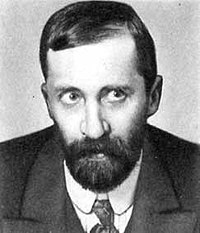 Ainsi, la Russie est importante dans cette trame générale d’une interprétation historique du « katechon » car elle est l’antidote à « la folie eschatologique ». La Russie est l’héritière de Byzance mais aussi l’héritière directe de la « Forme romaine ». Elle était considérée comme le bastion du conservatisme avant 1917, même si ce conservatisme fut fossilisé par Konstantin Pobiedonostsev comme a pu l'observer Dmitri Merejkovsky qui rejetta par la suite tous les aspects démoniaques de la révolution russe. La Russie n'a pas expérimenté le même traumatisme que l'Europe au 16ème siècle avec la Réforme et les guerres de religion, les destructions perpétrées par les iconoclastes; elle a ensuite été préservée des sottes philosophies déistes des Whigs anglais ou des folies des Lumières françaises du 18ème siècle. Cela ne veut pas dire, comme l'entend la vulgate occidentaliste, que la Russie est un pays arriéré: Catherine II était une impératrice animée par l'idéologie des Lumières, mais des Lumières dites "despotiques" et, par voie de conséquence, pragmatiques et constructives. Elle fit de la Russie une grande puissance. Alexandre I était animé par des idées religieuses traditionnelles et apaisantes, que nous devrions réétudier attentivement aujourd'hui, surtout après le désastre syrien. Alexandre II a modernisé le pays à grande vitesse à la fin du 19ème siècle et a pu éliminer tous les handicaps imposés à la Russie après le Traité de Paris de 1856 qui mit fin à la guerre de Crimée. En fin de compte, la Russie, à la notable exception des premières décennies du régime bolchevique, semble avoir été immunisée contre la toxicité dangereuse que constitue la "théologie de la précipitation".
Ainsi, la Russie est importante dans cette trame générale d’une interprétation historique du « katechon » car elle est l’antidote à « la folie eschatologique ». La Russie est l’héritière de Byzance mais aussi l’héritière directe de la « Forme romaine ». Elle était considérée comme le bastion du conservatisme avant 1917, même si ce conservatisme fut fossilisé par Konstantin Pobiedonostsev comme a pu l'observer Dmitri Merejkovsky qui rejetta par la suite tous les aspects démoniaques de la révolution russe. La Russie n'a pas expérimenté le même traumatisme que l'Europe au 16ème siècle avec la Réforme et les guerres de religion, les destructions perpétrées par les iconoclastes; elle a ensuite été préservée des sottes philosophies déistes des Whigs anglais ou des folies des Lumières françaises du 18ème siècle. Cela ne veut pas dire, comme l'entend la vulgate occidentaliste, que la Russie est un pays arriéré: Catherine II était une impératrice animée par l'idéologie des Lumières, mais des Lumières dites "despotiques" et, par voie de conséquence, pragmatiques et constructives. Elle fit de la Russie une grande puissance. Alexandre I était animé par des idées religieuses traditionnelles et apaisantes, que nous devrions réétudier attentivement aujourd'hui, surtout après le désastre syrien. Alexandre II a modernisé le pays à grande vitesse à la fin du 19ème siècle et a pu éliminer tous les handicaps imposés à la Russie après le Traité de Paris de 1856 qui mit fin à la guerre de Crimée. En fin de compte, la Russie, à la notable exception des premières décennies du régime bolchevique, semble avoir été immunisée contre la toxicité dangereuse que constitue la "théologie de la précipitation".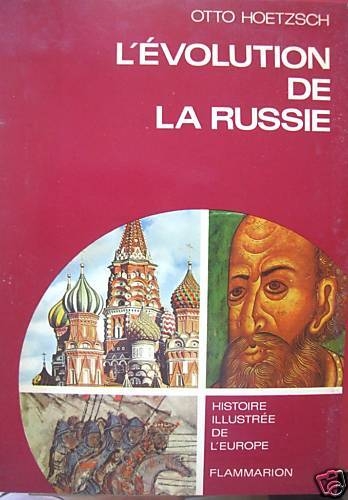
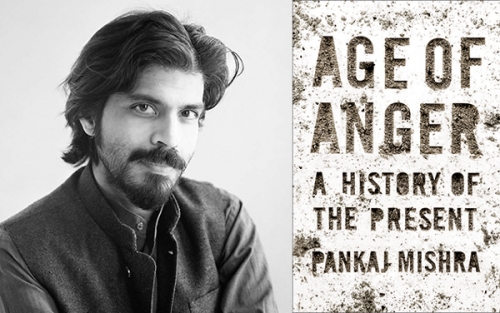
 La flotte française qui battit en 1783 l’Angleterre en Amérique du Nord permit la complète indépendance des États-Unis. La Russie put alors conquérir l’Alaska, établir un comptoir en Californie et envisager une alliance hispano-russe dans le Nouveau Monde. Les marins russes purent accoster dans les îles Hawaii et les offrir à leur Tsar. A leur niveau, les expéditions françaises dans le Pacifique furent fructueuses et personne n’oubliera jamais que Louis XVI quelques minutes avant de monter les marches qui le conduisirent à l’échafaud, demanda des nouvelles de La Pérouse, qui s’était perdu en explorant les eaux du Pacifique. Ce premier dessein eurasien avant la lettre fut torpillé par les Révolutionnaires français payés et excités par les Anglais et les services secrets de Pitt, comme le raconte bien l’historien Olivier Blanc dans
La flotte française qui battit en 1783 l’Angleterre en Amérique du Nord permit la complète indépendance des États-Unis. La Russie put alors conquérir l’Alaska, établir un comptoir en Californie et envisager une alliance hispano-russe dans le Nouveau Monde. Les marins russes purent accoster dans les îles Hawaii et les offrir à leur Tsar. A leur niveau, les expéditions françaises dans le Pacifique furent fructueuses et personne n’oubliera jamais que Louis XVI quelques minutes avant de monter les marches qui le conduisirent à l’échafaud, demanda des nouvelles de La Pérouse, qui s’était perdu en explorant les eaux du Pacifique. Ce premier dessein eurasien avant la lettre fut torpillé par les Révolutionnaires français payés et excités par les Anglais et les services secrets de Pitt, comme le raconte bien l’historien Olivier Blanc dans 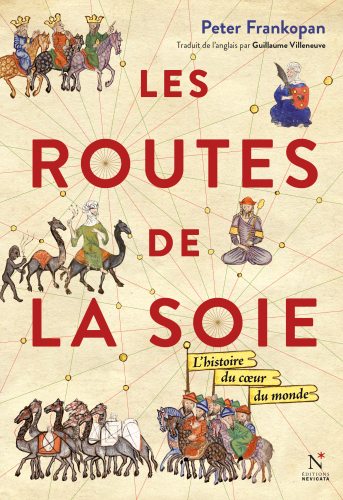
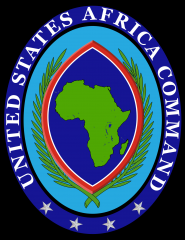 Dans un futur proche, les États-Unis essaieront à tout prix de conserver leur domination sur l’Europe de l’Ouest (même si d’un autre côté, ils tentent aussi de la fragiliser encore plus par les vagues migratoires incontrôlées et les initiatives de Soros), ils feront aussi tout pour asseoir leur domination sur l’Amérique latine et plus particulièrement sur l’Afrique, où ils développent une nouvelle forme d’impérialisme original à travers l’AFRICOM, une structure de commandement conçue justement pour endiguer les Chinois et faire sortir les Français de leur Françafrique tout en enjoignant à ces derniers de participer au processus militaire de leur propre neutralisation ! Nonobstant, cette politique internationale est condamnée à l’échec parce que l’ubiquité du contrôle total qu’elle suppose demeure impossible à tenir sur la base de seulement 350 millions de contribuables.
Dans un futur proche, les États-Unis essaieront à tout prix de conserver leur domination sur l’Europe de l’Ouest (même si d’un autre côté, ils tentent aussi de la fragiliser encore plus par les vagues migratoires incontrôlées et les initiatives de Soros), ils feront aussi tout pour asseoir leur domination sur l’Amérique latine et plus particulièrement sur l’Afrique, où ils développent une nouvelle forme d’impérialisme original à travers l’AFRICOM, une structure de commandement conçue justement pour endiguer les Chinois et faire sortir les Français de leur Françafrique tout en enjoignant à ces derniers de participer au processus militaire de leur propre neutralisation ! Nonobstant, cette politique internationale est condamnée à l’échec parce que l’ubiquité du contrôle total qu’elle suppose demeure impossible à tenir sur la base de seulement 350 millions de contribuables.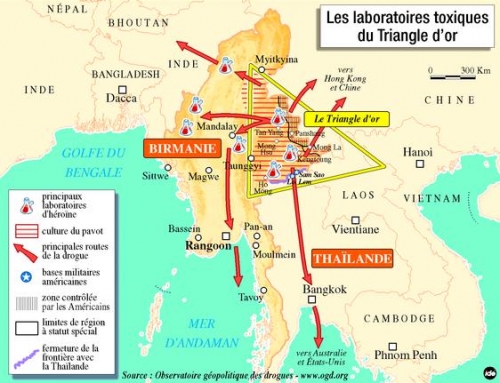
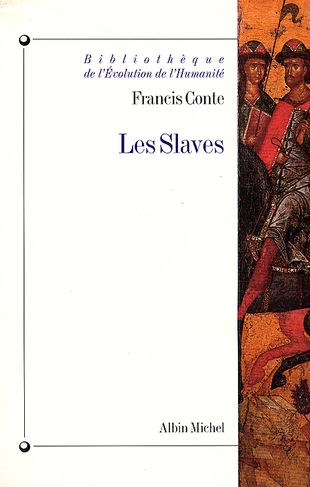 Et c’est ainsi que nous fûmes attirés par les Scythes, surtout après avoir lu un livre de l’historien français Francis Conte où il nous rappelait que les origines de nombreux peuples slaves remontaient non seulement aux tribus slaves mais aussi aux cavaliers Sarmates, y compris ceux qui les avaient nourris auparavant, la cavalerie des légions romaines.
Et c’est ainsi que nous fûmes attirés par les Scythes, surtout après avoir lu un livre de l’historien français Francis Conte où il nous rappelait que les origines de nombreux peuples slaves remontaient non seulement aux tribus slaves mais aussi aux cavaliers Sarmates, y compris ceux qui les avaient nourris auparavant, la cavalerie des légions romaines.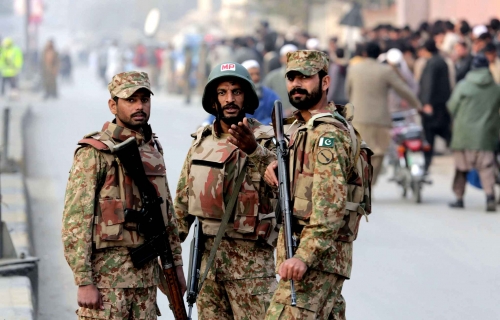

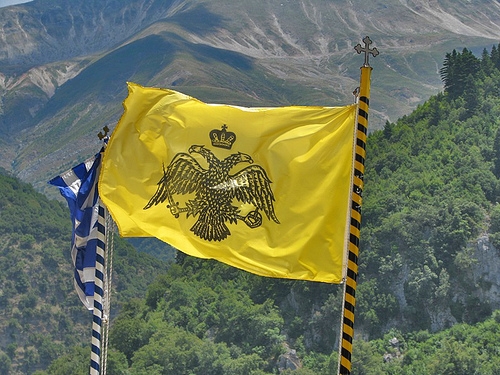
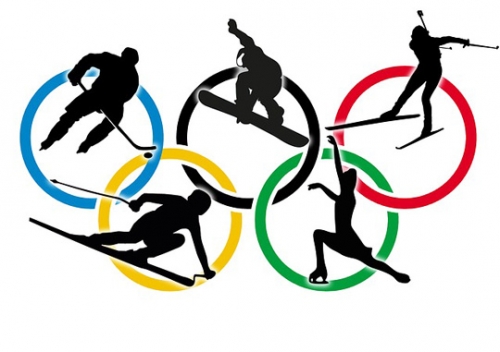


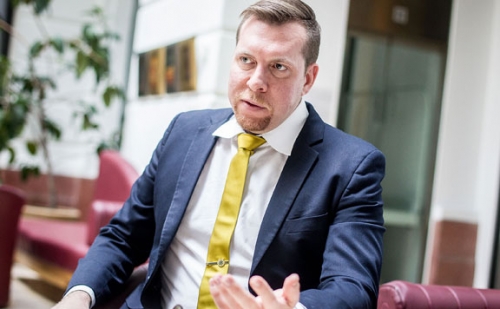
 Dans son texte, « Le retour de la vraie Droite », l’auteur revient en premier lieu sur l’ascension culturelle de la Gauche et conqtate que « les idéaux de l’Occident ont subi une inversion totale, et des idées qui se situaient initialement à la périphérie de l’extrême gauche ont été élevées au rang de normes sociales qui prévalent aujourd’hui dans l’éducation, les médias, les institutions gouvernementales et les ONG privées (p. 2) ». Un tel résultat, nous explique l’auteur, n’aurait pas pu être possible sans « les sociologues et philosophes marxistes de l’Institut für Sozialforschung de Francfort [qui], au début du XXe siècle, visaient, au travers de la conception de la philosophie et leur analyse sociale sélective, à saper la confiance dans les valeurs et hiérarchies traditionnelles (p. 2) ». Sans doute que d’autres facteurs sont rentrés en ligne de compte concernant l’involution de l’Occident, et non pas uniquement des facteurs politiques, mais cela ne rentre peut-être pas dans la grille de lecture de l’auteur – ce qui n’enlève rien, par ailleurs, à la justesse de ses propos.
Dans son texte, « Le retour de la vraie Droite », l’auteur revient en premier lieu sur l’ascension culturelle de la Gauche et conqtate que « les idéaux de l’Occident ont subi une inversion totale, et des idées qui se situaient initialement à la périphérie de l’extrême gauche ont été élevées au rang de normes sociales qui prévalent aujourd’hui dans l’éducation, les médias, les institutions gouvernementales et les ONG privées (p. 2) ». Un tel résultat, nous explique l’auteur, n’aurait pas pu être possible sans « les sociologues et philosophes marxistes de l’Institut für Sozialforschung de Francfort [qui], au début du XXe siècle, visaient, au travers de la conception de la philosophie et leur analyse sociale sélective, à saper la confiance dans les valeurs et hiérarchies traditionnelles (p. 2) ». Sans doute que d’autres facteurs sont rentrés en ligne de compte concernant l’involution de l’Occident, et non pas uniquement des facteurs politiques, mais cela ne rentre peut-être pas dans la grille de lecture de l’auteur – ce qui n’enlève rien, par ailleurs, à la justesse de ses propos.